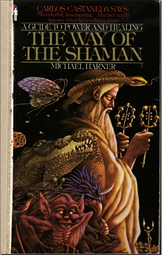
Discovering the Way of the Shaman
From The Way of the Shaman by Michael Harner
Chapter 1. Discovering the way
In 1960 and 1961, the American Museum of Natural History invited me to make a year-long expedition to the Peruvian Amazon to study the culture of the Conibo Indians of the Ucayali River region. I accepted, delighted to have an opportunity to do more research on the fascinating Upper Amazon forest cultures.
Two particular experiences I had among the Conibo and the Jivaro were basic to my discovering the way of the shaman in both those cultures, and I would like to share them with you. Perhaps they will convey something of the incredible hidden world open to the shamanic explorer.
I had been living for the better part of a year in a Conibo Indian village beside a remote lake off a tributary to the Rio Ucayali. My anthropological research on the culture of the Conibo had been going well, but my attempts to elicit information on their religion me with little success. The people were very friendly, but reluctant to talk about the supernatural. Finally they told me that if I really wished to learn, I must take the shaman's sacred drink made from ayahuasca, the "soul vine." I agreed, with both curiousity and trepidation, for they warned me that the experience would be very frightening.
The next morning my friend Tomas, the kind elder of the village, went into the forest to cut the vines. Before leaving, he told me to fast: a light breakfast and no lunch. He returned midday with enough ayahuasca vines and leaves of the cawa plant to fill a fifteen gallon pot. He boiled them all afternoon, until only about a quart of dark liquid remained. This he poured into an old bottle and left it to cool until sunset, when he said we would drink it.
The Indians muzzled the dogs in the village so that they could not bark. The noise of barking dogs cold drive a man who had taken ayahuasca mad, I was told. The children were cautioned to be quiet, and silence came over the small community with the setting of the sun.
As the brief equatorial twilight was replaced by darkness, Tomas poured about a third of the bottle into a gourd bowl and gave it to me. All the Indians were watching. I felt like Socrates amidst his Athenian compatriots, accepting the hemlock - it occurred to me that one of the alternate names people in the Peruvian Amazon gave ayahuasca was "the little death." I drank the potion quickly. It had a strange, slightly bitter taste. I then waited for Tomas to take his turn, but he said that he had decided not to participate after all.
They had me lie down on the bamboo platform under the great thatched roof of the communal house. The village was silent, except for the chirping of crickets and the distant calls of a howler monkey deep in the jungle.
As I stared upward into the darkness, faint lines of light appeared. They grew sharper, more intricate, and burst into brilliant colors. Sound came from far away, a sond like a waterfall, which grew stronger and stronger until it filled my ears.
Just a few minutes earlier I had been disappointed, sure that the ayahuasca was not going to have any effect on me. Now the sound of rushing water flooded my brain. My jaw began to feel numb, and the numbness was moving up to my temples.
Overhead the faint lines became brighter, and gradually interlaced to form a canopy resembling a geometric mosaic of stained glass. The bright violet hues formed an ever-expanding roof above me. Within this celestial cavern, I heard the sound of water grow louder and I could see dim figures engaged in shadowy movements. As my eyes seemed to adjust to the gloom, the moving scene resolved itself into something resembling a huge fun house, a supernatural carnival of demons. In the center, presiding over the activities, and looking directly at me, was a gigantic, grinning crocodilian head, from whose cavernous jaws gushed a torrential flood of water. Slowly the waters rose, and so did the canopy above them, until the scene was metamorphosed into a simple duality of blue sky above and sea below. All creatures had vanished.
Then, from my position near the surface of the water, I began to see two strange boats wafting back and forth, floating through the air towards me, coming closer and closer. They slowly combined to form a single vessel with a huge dragon-headed prow, not unlike that of a Viking ship. Set amidships was a square sail. Gradually, as the boat gently floated back and forth above me, I heard a rhythmic swishing sound and saw that it was a giant galley with several hundred oars moving back and forth in cadence with the sound.
I became conscious, too, of the most beautiful singing I have ever heard in my life, high-pitched and ethereal, emanating from myriad voices on board the galley. As I looked more closely at the deck, I could make out large numbers of people with the heads of blue jays and the bodies of humans, not unlike the bird-headed gods of ancient Egypt.
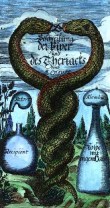
I became aware of my brain. I felt—physically—that it had become compartmentalized into four separate and distinct levels. At the uppermost surface was the observer and commander, which was conscious of the condition of my body, and was responsible for the attempt to keep my heart going. lt perceived, but purely as a spectator, the visions emanating from what seemed to be the nether portions of my brain. Immediately below the topmost level I felt a numbed layer, which seemed to have been put out of commission by the drug—it just wasn't there. The next level down was the source of my visions, including the soul boat. Now I was virtually certain I was about to die.
As I tried to accept my fate, an even lower portion of my brain began to transmit more visions and information. I was "told" that this new material was being presented to me because I was dying and therefore "safe" to receive these revelations. These were the secrets reserved for the dying and the dead, I was informed.
I could only very dimly perceive the givers of these thoughts: giant reptilian creatures reposing sluggishly at the lowermost depths of the back of my brain, where it met the top of the spinal column. I could only vaguely see them in what seemed to be gloomy, dark depths. Then they projected a visual scene in front of me.
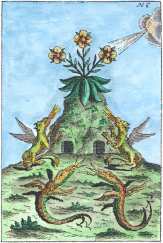
First they showed me the planet Earth as it was eons ago, before there was any life on it. I saw an ocean, barren land, and a bright blue sky. Then black specks dropped from the sky by the hundreds and landed in front of me on the barren landscape. I could see that the "specks" were actually large, shiny, black creatures with stubby pterodactyl-like wings and huge whale-like bodies. Their heads were not visible to me. They flopped down, utterly exhausted from their trip, resting for eons.
They explained to me in a kind of thought language that they were fleeing from something out in space. They had come to the planet Earth to escape their enemy. The creatures then showed me how they had created life on the planet in order to hide within the multitudinous forms and thus disguise their presence. Before me, the magnificence of plant and animal creation and speciation—hundreds of millions of years of activity—took place on a scale and with a vividness impossible to describe. I learned that the dragon-like creatures were thus inside of all forms of life, including man. They were the true masters of humanity and the entire planet, they told me. We humans were but the receptacles and servants of these creatures. For this reason they could speak to me from within myself.
These revelations, welling up from the depths of my mind, alternated with visions of the floating galley, which had almost finished taking my soul on board. The boat with its blue-jay headed deck crew was gradually drawing away, pulling my life force along as it headed toward a large fjord flanked by barren, worn hills. I knew I had only a moment more to live. Strangely, I had no fear of the bird-headed people; they were welcome to have my soul if they could keep it. But I was afraid that somehow my soul might not remain on the horizontal plane of the fjord but might, through processes unknown but felt and dreaded, be acquired or re-acquired by the dragon-like denizens of the depths. I suddenly felt my distinctive humanness, the contrast between my species and the ancient reptilian ancestors. I began to struggle against returning to the ancient ones, who were beginning to feel increasingly alien and possibly evil. Each heart beat was a major undertaking. I turned to human help. With an unimaginable last effort, I barely managed to utter one word to the Indians:
"Medicine!"
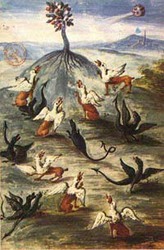
I saw them rushing around to make an antidote, and I knew they could not prepare it in time. I needed a guardian who could defeat dragons, and I frantically tried to conjure up a powerful being to protect me against the alien reptilian creatures. One appeared before me; and at that moment the Indians forced my mouth open and poured the antidote into me. Gradually, the dragons disappeared back into the lower depths; the soul boat and the fjord were no more. I relaxed with relief. The antidote radically eased my condition, but it did not prevent me from having many additional visions of a more superficial nature. These were manageable and enjoyable. I made fabulous journeys at will through distant regions, even out into the Galaxy; created incredible architecture; and employed sardonically grinning demons to realize my fantasies. Often I found myself laughing aloud at the incongruities of my adventures. Finally, I slept.
Rays of sunlight were piercing the holes in the palm-thatched roof when I awoke. I was still lying on the bamboo platform, and I heard the normal, morning sounds all around me: the Indians conversing, babies crying, and a rooster crowing. I was surprised to discover that I felt refreshed and peaceful. As I lay there looking up at the beautiful woven pattern of the roof, the memories of the previous night drifted across my mind. I momentarily stopped myself from remembering more in order to get my tape recorder from a duffle bag. As I dug into the bag, several of the Indians greeted me, smiling. An old woman, Tomás' wife, gave me a bowl of fish and plantain soup for breakfast. lt tasted extraordinarily good. Then I went back to the platform, eager to put my night's experiences on tape before I forgot anything. The work of recall went easily except for one portion of the trance that I could not remember. It remained blank, as though a tape had been erased. I struggled for hours to remember what had happened in that part of the experience, and I virtually wrestled it back into my consciousness.
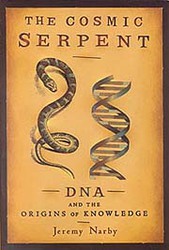
The recalcitrant material turned out to be the communication from the dragon-like creatures, including the revelation of their role in the evolution of life on this planet and their innate domination of living matter, including man. I was highly excited at rediscovering this material, and could not help but feel that I was not supposed to be able to bring it back from the nether regions of the mind. I even had a peculiar sense of fear for my safety, because I now possessed a secret that the creatures had indicated was only intended for the dying. I immediately decided to share this knowledge with others so that the "secret" would not reside in me alone, and my life would not be in jeopardy. I put my outboard motor on a dugout canoe and left for an American evangelist mission station nearby.
I arrived about noon. The couple at the mission, Bob and Millie, were a cut above the average evangelists sent from the United States: hospitable, humorous, and compassionate. I told them my story. When I described the reptile with water gushing out of his mouth, they exchanged glances, reached for their Bible, and read to me the following line from Chapter 12 in the Book of Revelation:
And the serpent cast out of his mouth water as a flood
They explained to me that the word "serpent" was synonymous in the Bible with the words "dragon" and "Satan." I went on with my narrative. When I came to the part about the dragon-like creatures fleeing an enemy somewhere beyond the Earth and landing here to hide from their pursuers, Bob and Millie became excited and again read me more from the same passage in the Book of Revelation:
And there was a war in heaven: Michael and his angels fought against the dragon; and the dragon fought and his angels. And prevailed not; neither was their place found any more in heaven. And the great dragon was cast out, that old serpent, called the Devil, and Satan, which deceiveth the whole world: he was cast out into the earth, and his angels with him.
I listened with surprise and wonder. The missionaries, in turn, seemed to be awed by the fact that an atheistic anthropologist, by taking the drink of the "witch doctors," could apparently have revealed to him some of the same holy material in the Book of Revelation. When I had finished my account, I was relieved to have shared my new knowledge, but I was also exhausted. I fell asleep on the missionaries' bed, leaving them to continue their discussion of the experience.
That evening, as I returned to the village in my canoe, my head began to throb in rhythm with the noise of the outboard motor; I thought I was going mad; I had to stick my fingers in my ears to avoid the sensation. I slept well, but the next day I noticed a numbness or pressure in my head.
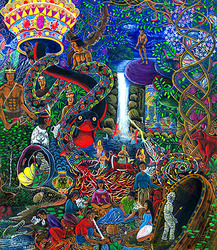
I was now eager to solicit a professional opinion from the most supernaturally knowledgeable of the Indians, a blind shaman who had made many excursions into the spirit world with the aid of the ayahuasca drink. lt seemed only proper that a blind man might be able to be my guide to the world of darkness. I went to his hut, taking my notebook with me, and described my visions to him segment by segment. At first I told him only the highlights; thus, when I came to the dragon-like creatures, I skipped their arrival from space and only said, "There were these giant black animals, something like great bats, longer than the length of this house, who said that they were the true masters of the world." There is no word for dragon in Conibo, so "giant bat" was the closest I could come to describe what I had seen.
He stared up toward me with his sightless eyes, and said with a grin, "Oh, they're always saying that. But they are only the Masters of Outer Darkness."
He waved his hand casually toward the sky. I felt a chill along the lower part of my spine, for I had not yet told him that I had seen them, in my trance, coming from outer space. I was stunned. What I had experienced was already familiar to this barefoot, blind shaman. Known to him from his own explorations of the same hidden world into which I had ventured. From that moment on I decided to learn everything I could about shamanism.
And there was something more that encouraged me in my new quest. After I recounted my entire experience, he told me that he did not know of anyone who had encountered and learned so much on his first ayahuasca journey.
"You can surely be a master shaman," he said.
http://deoxy.org/shamanway.htmShamanism.org "What's really important about shamanism is that there is another reality that you can personally discover…we are not alone."
— Michael Harner
Over tens of thousands of years, shamans developed a time-tested system of healing, using journeying and other practices. Michael Harner uncovered and synthesized these methods, enabling a breathtaking and personal access to the spiritual realms that is available to everyone. These teachings make possible nothing short of union with the entire cosmos.
http://www.shamanism.org/ 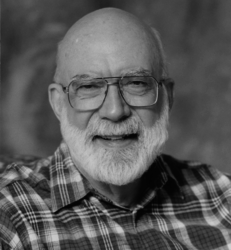
Michael HarnerMichael Harner (born 1929) is the founder of the Foundation for Shamanic Studies and the formulator of "core shamanism." Harner is known for bringing shamanism and shamanic healing to the contemporary Western world. Walsh and Grob note in their book, Higher Wisdom, "Michael Harner is widely acknowledged as the world's foremost authority on shamanism and has had an enormous influence on both the academic and lay worlds…. What Yogananda did for Hinduism and D. T. Suzuki did for Zen, Michael Harner has done for shamanism, namely bring the tradition and its richness to Western awareness."[1] Harner received a Ph.D. in anthropology from the University of California at Berkeley in 1963. He taught there and at Columbia University, Yale University, and the Graduate Faculty of the New School for Social Research, where he chaired the anthropology department. He also co-chaired the Anthropology Section of the New York Academy of Sciences. In 1987 Harner left academic anthropology to devote himself full-time to the preservation, study, and teaching of shamanism as president of the non-profit Foundation for Shamanic Studies. In 2003 he received an honorary doctorate for his work from the California Institute of Integral Studies. In 2009 two sessions on shamanism were given in his honor at the annual meeting of the American Anthropological Association. He received the 2009 Pioneer in Integrative Medicine Award, Institute of Health and Healing.
https://en.wikipedia.org/wiki/Michael_Harner >>6562Bringing Shamanism and Shamanic Healing to the WestAfter Harner's Amazonian shamanic training with the hallucinogen ayahuasca, he started experimenting with monotonous drumming, discovering that there was no need for psychoactive substances in order to have successful shamanic journeys. Using the drum journey, he soon developed a more comprehensive shamanic practice, which led to invitations for him to introduce others to shamanism and shamanic healing. In response to such requests, he started giving training workshops in the early 1970s to small groups. As interest in this training grew, in 1979 he founded the Center for Shamanic Studies in Norwalk, Connecticut.
In 1980, Harner published
The Way of the Shaman: A Guide to Power and Healing.Soon increasing numbers of Westerners both in the United States and Europe were studying core shamanism with him. Anthropologist Joan Townsend clearly distinguished Harner's core shamanism from neo-shamanism.
Harner then integrated his Center for Shamanic Studies into the non-profit Foundation for Shamanic Studies. The Foundation rapidly grew, with financial support primarily coming from the shamanic training courses and workshops he taught, supplemented by private donations. From the early 1980s onward, as demand for his workshops continued to grow, he invited a few of his more advanced students to join an international faculty to reach an ever-wider audience. Finally in 1987, Harner resigned his professorship to devote himself full-time to the work of the Foundation, preferring to transmit his knowledge to the Foundation faculty and students in the oral tradition of shamanism, rather than through publication. Exceptions have included a shamanic primer for physicians and a shamanic theory of dreams.
In 2013 Michael Harner published
Cave and Cosmos: Shamanic Encounters with Another Reality, the long awaited sequel to his classic work
The Way of the Shaman. He turned over the presidency of the Foundation for Shamanic Studies (FSS) to Susan Mokelke. As of 2013, he continues his shamanic research and remains active in the FSS as Vice President and as Director of the Shamanic Knowledge Conservatory.
https://en.wikipedia.org/wiki/Michael_Harner#Bringing_Shamanism_and_Shamanic_Healing_to_the_West If anyone wants me to upload the book it's 91.9 MB
>>6631>tfw shitty internet, i can't even download a java update:/ I shall download it tomorrow at a better internet source. I've about had it with this shitty internet, all I can do is post online. I can't even post on 4chan it sucks, I only have good internet on the weekends and i really want to read haha
>>6634Don't worry about it man, I personally hold Shamanism in lowly regard for its use of drugs. It's interesting to expand your knowledge and get an even bigger sampler of all the magic in this world but I feel it's an inferior tradition compared to ascetic practises. That said this guy has actually developed a Shamanism without drugs… (
>>6563 )
"After Harner's Amazonian shamanic training with the hallucinogen ayahuasca, he started experimenting with monotonous drumming, discovering that there was no need for psychoactive substances in order to have successful shamanic journeys."I bet "Shamanic Journeys" is astral projection btw.
>>6638I just want more reading material and I've been interested in Shamanism. The closest I've been to it is playing a human shaman in WoW haha. I just want to read up on Shamanism as I've never done so, and that book looks like a good one.
The Teachings of Don Juan, Carlos Castaneda, chapter 3
As I was getting ready to leave, I decided to ask him once more about the enemies of a man of knowledge. I argued that I could not return for some time, and it would be a good idea to write down what he had to say, and then think about it while I was away.
He hesitated for a while, but then began to talk.
"When a man starts to learn, he is never clear about his objectives. His purpose is faulty. His intent is vague. He hopes for rewards that will never materialize, for he knows nothing of the hardships of learning.
"He slowly begins to learn- bit by bit at first, then in big chunks. And his thoughts soon clash. What he learns is never what he pictured, or imagined, and so he begins to be afraid. Learning is never what one expects. Every step of learning is a new task, and the fear the man is experiencing begins to mount mercilessly, unyieldingly. His purpose becomes a battlefield.
"And thus he has tumbled upon the first of his natural enemies: Fear! A terrible enemy- treacherous, and difficult to overcome. It remains concealed at every turn of the way, prowling, waiting. And if the man, terrified in its presence, runs away, his enemy will have put an end to his quest."
"What will happen to the man if he runs away in fear?"
"Nothing happens to him except that he will never learn. He will never become a man of knowledge. He will perhaps be a bully or a harmless, scared man. At any rate, he will be a defeated man. His first enemy will have put an end to his cravings."
"And what can he do to overcome fear?"
"The answer is very simple. He must not run away. He must defy his fear, and in spite of it, he must take the next step in learning, and the next, and the next. He must be fully afraid, and yet he must not stop. That is the rule! And a moment will come when his first enemy retreats. The man begins to feel sure of himself. His intent becomes stronger. Learning is no longer a terrifying task.
"When this joyful moment comes, the man can say without hesitation that he has defeated his first natural enemy."
"Does it happen at once, don Juan, or little by little?"
"It happens little by little, and yet the fear is vanquished suddenly and fast."
"But will the man not be afraid again if something new happens to him?"
"No. Once a man has vanquished fear, he is free from it for the rest of his life because, instead of fear, he has acquired clarity- a clarity of mind which erases fear. By then a man knows his desires. He knows how to satisfy those desires. He can anticipate the new steps of learning, and a sharp clarity surrounds everything. The man feels that nothing is concealed.
"And thus he has encountered his second enemy: Clarity! That clarity of mind which is so hard to obtain, dispels fear but also blinds.
"It forces the man never to doubt himself. It gives him the assurance he can do anything he pleases, for he sees clearly into everything; and he is courageous because he is clear; and he stops at nothing because he is clear.
"But all that is a mistake. It is like something incomplete. If the man yields to this make-believe power, he has succumbed to his second enemy and will fumble with learning. He will rush when he should be patient, or he will be patient when he should rush; and he will fumble with learning until he winds up incapable of learning anything more."
"What becomes of a man who is defeated in that way, don Juan? Does he die as a result?"
"No, he does not die. His second enemy has just stopped him cold from trying to become a man of knowledge. Instead, the man may turn into a buoyant warrior, or a clown. Yet the clarity for which he has paid so dearly will never change to darkness and fear again. He will be clear as long as he lives, but he will no longer learn, or yearn for anything."
"But what does he have to do to avoid being defeated?"
"He must do what he did with fear. He must defy his clarity and use it only to see, and wait patiently and measure carefully before taking new steps. He must think, above all, that his clarity is almost a mistake; and a moment will come when he will understand that his clarity was only a point before his eyes.
"And thus he will have overcome his second enemy, and will arrive at a position where nothing can harm him any more. This will not be a mistake. It will not be only a point before his eyes. It will be true power.
"He will know at this point that the power he has been pursuing for so long is finally his. He can do with it whatever he pleases. His ally is at his command. His wish is the rule. He sees all that is around him. But he has also come across his third enemy: Power!
"Power is the strongest of all enemies. And naturally, the easiest thing to do is to give in. After all, the man is truly invincible. He commands: He begins by taking calculated risks, and ends in making rules because he is a master.
"A man at this stage hardly notices his third enemy closing in on him; and suddenly, without knowing, he will certainly have lost the battle. His enemy will have turned him into a cruel, capricious man."
"Will he lose his power?"
"No, he will never lose his clarity or his power."
"What then will distinguish him from a man of knowledge?"
"A man who is defeated by power dies without really knowing how to handle it. Power is only a burden upon his fate. Such a man has no command over himself, and cannot tell when or how to use his power."
"Is the defeat by any of these enemies a final defeat?"
"Of course it is final. Once one of these enemies overpowers a man there is nothing he can do."
"Is it possible, for instance, that the man who is defeated by power may see his error and mend his ways?"
"No. Once a man gives in he is through." "But what if he is temporarily blinded by power, and then refuses it?"
"That means his battle is still on. That means he is still trying to become a man of knowledge. A man is defeated only when he no longer tries, and abandons himself."
"But then, don Juan, it is possible that a man may abandon himself to fear for years, but finally conquer it."
"No, that is not true. If he gives in to fear, he will never conquer it because he will shy away from learning and never try again. But if he tries to learn for years in the midst of his fear, he will eventually conquer it because he will never have really abandoned himself to it."
"How can he defeat his third enemy, don Juan?"
"He has to defy it, deliberately. He has to come to realize the power he has seemingly conquered is in reality never his. He must keep himself in line at all times, handling carefully and faithfully all that he has learned. If he can see that clarity and power without his control over himself are worse than mistakes, he will reach a point where everything is held in check. He will know then when and how to use his power; and thus he will have defeated his third enemy.
"The man will be, by then, at the end of his journey of learning, and almost without warning he will come upon the last of his enemies: Old age! This enemy is the cruelest of all; the one he will not be able to defeat completely, but only fight away.
"This is the time when a man has no more fears, no more impatient clarity of mind- a time when all his power is in check, but also the time when he has an unyielding desire to rest. If he gives in totally to his desire to lie down and forget; if he soothes himself in tiredness, he will have lost his last round and his enemy will cut him down into a feeble old creature. His desire to retreat will overrule all his clarity, his power, and his knowledge.
"But if the man sloughs off his tiredness, and lives his fate through, he can then be called a man of knowledge; if only for the brief moment when he succeeds in fighting off his last, invincible enemy. That moment of clarity, power, and knowledge is enough."
>>7003I post this because I think a few of us on this board are running into the second enemy of clarity and are back into the bad habit of dismissing things out of hand, as if we already know the answers.
I feel I understand magic, like I've dodged all the disinfo. I don't think I'm deluded about anything. The truth is that I would not know I'm deluded if I were.
For example, I think Thelema is bullshit. I'll still study their system in-depth at some point.
>>7108Does Thelema even do their own rituals or do they do the same ones over and over?
>>7109typical thelemite ritual:
>heat up heroin in a spoon>put heroin in needle>stick needle in arm >>7117At least they're not smoking it, wasteful route of administration.
>>6638Tales of Power, Carlos Castaneda, page 5
> "Why did you make me take those power plants so many times?" I asked.> He laughed and mumbled very softly, "'Cause you're dumb."> I heard him the first time, but I wanted to make sure and pretended I had not understood.> "I beg your pardon?" I asked.> "You know what I said," he replied and stood up.> He tapped me on the head as he walked by me.> "You're rather slow," he said. "And there was no other way to jolt you."> "So none of that was absolutely necessary?" I asked.> "It was, in your case. There are other types of people, however, that do not seem to need them." >>7871Aw yeah ascetic master race confirmed superior again to drug-users.